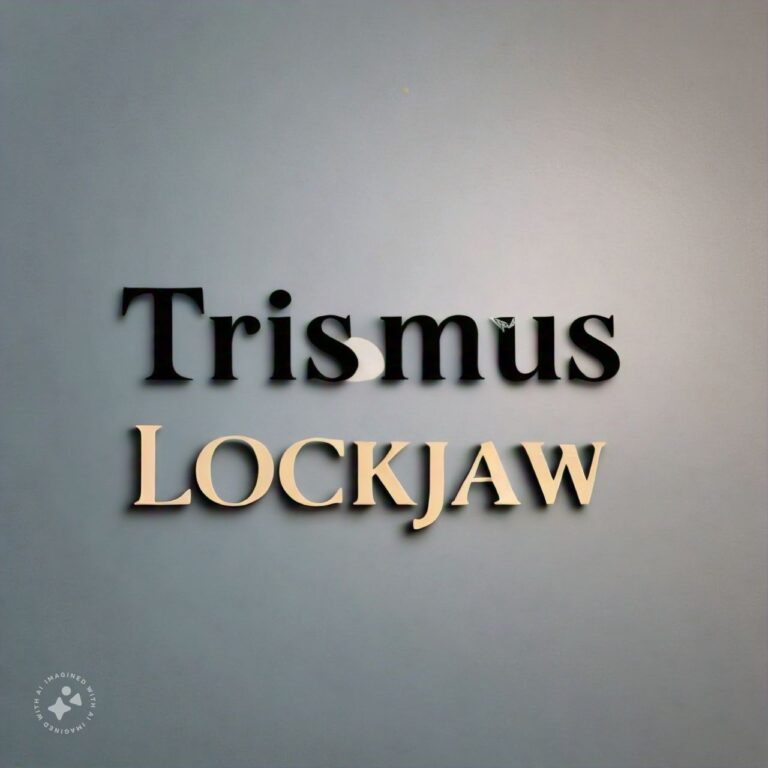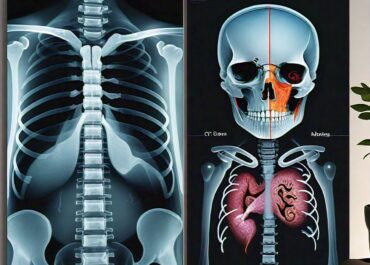
Differences Between Trismus and Lockjaw
Trismus and lockjaw are two conditions that cause a person to have difficulty opening their mouth, but they stem from different underlying causes. Trismus is a condition characterized by the restricted ability to open the mouth due to muscle spasms, damage, or other factors involving the jaw muscles. It can be caused by trauma, oral surgery, infections, or radiation therapy targeting head and neck cancers. The condition can range from mild to severe, significantly affecting a person’s ability to eat, speak, and maintain oral hygiene. Early treatment is essential to restore jaw mobility and prevent long-term complications.
On the other hand, lockjaw is a specific symptom of tetanus, a bacterial infection caused by Clostridium tetani. The bacteria produce a toxin that affects the nervous system, leading to painful muscle spasms, most commonly in the jaw and neck. Lockjaw is often one of the first signs of tetanus, and it can progress to affect other muscles in the body if left untreated. Unlike trismus, which can result from a variety of causes, lockjaw is strictly associated with tetanus. Both conditions can cause significant discomfort and impair daily functioning, but understanding the difference in their causes and treatments is essential for effective management.
Trismus Overview
Trismus is a condition in which the ability to open the mouth is restricted due to a variety of causes. Below are five key aspects of trismus.
1. What is Trismus?
Trismus, commonly referred to as “jaw tightness,” is the restricted or limited ability to open the mouth fully. This condition is caused by spasms or tightness in the muscles responsible for opening the jaw, known as the muscles of mastication. These muscles include the masseter, temporalis, and pterygoid muscles. Trismus can result from several factors, such as trauma to the jaw, infections, oral surgery, or treatments like radiation therapy, especially for head and neck cancers. Patients with trismus may struggle to eat, speak, or maintain proper oral hygiene, making it a frustrating and debilitating condition.
- Muscle Tightness: Caused by issues with the jaw muscles responsible for opening the mouth.
- Multiple Causes: Can result from trauma, surgery, infections, or radiation therapy.
2. Symptoms of Trismus
The main symptom of trismus is the inability to open the mouth fully, but other symptoms may accompany it:
- Restricted Mouth Opening: The range of motion in the jaw is significantly reduced, typically less than 35-40 millimeters (mm), depending on the severity.
- Jaw Pain: Some patients experience pain or discomfort in the jaw area, particularly when attempting to open the mouth.
- Difficulty Eating and Speaking: With a limited ability to open the mouth, patients may struggle to chew food, speak clearly, or even yawn comfortably.
- Muscle Spasms: In more severe cases, the muscles controlling the jaw may spasm, causing discomfort and further reducing the ability to open the mouth.
- Restricted Movement: Difficulty opening the mouth fully.
- Pain and Spasms: Jaw pain and spasms are common symptoms.
3. Causes of Trismus
Trismus can result from a variety of factors, including:
- Trauma: Injuries to the jaw, face, or mouth can cause damage to the muscles or joints, leading to trismus.
- Infections: Dental infections, such as a tooth abscess, can spread to the muscles of mastication and restrict jaw movement.
- Surgical Procedures: Oral or maxillofacial surgery, such as wisdom tooth extraction or jaw surgery, can sometimes result in temporary or long-term trismus.
- Radiation Therapy: Patients receiving radiation treatment for head and neck cancers are at risk of developing trismus as a side effect due to damage to the muscles or nerves involved in jaw movement.
- Trauma and Surgery: Common causes include injuries or surgical interventions in the jaw area.
- Infections and Radiation: Infections and radiation therapy can also lead to trismus.
4. Treatment of Trismus
The treatment for trismus depends on its underlying cause and severity. Common treatment options include:
- Physical Therapy: Exercises to stretch and strengthen the jaw muscles are often the first line of treatment. Devices like jaw stretchers can help improve range of motion.
- Medications: Anti-inflammatory drugs, muscle relaxants, or pain relievers can help reduce inflammation and muscle spasms.
- Botox Injections: In cases where muscle spasms are severe, Botox injections may be used to relax the muscles and improve jaw mobility.
- Surgical Intervention: In rare cases, surgical treatment may be required to remove scar tissue or correct structural issues causing trismus.
- Physical Therapy and Medications: Non-invasive treatments such as exercises and medications are often used.
- Surgical Options: Surgery may be needed in severe or persistent cases.
5. Prevention of Trismus
Preventing trismus involves avoiding risk factors when possible and practicing early intervention when symptoms arise. Key preventive measures include:
- Post-Surgical Care: Following instructions after oral or jaw surgery can help minimize the risk of developing trismus.
- Dental Hygiene: Preventing infections through proper dental care can reduce the likelihood of trismus caused by dental abscesses or other infections.
- Regular Exercises: Patients who undergo radiation therapy or surgery in the jaw area may be advised to perform daily jaw exercises to maintain mobility.
- Post-Surgical Care and Hygiene: Careful attention after surgery and good oral hygiene are important for prevention.
- Daily Exercises: Keeping the jaw muscles active can help prevent stiffness and restricted movement.
Lockjaw Overview
Lockjaw, also known as tetanus, is a symptom of tetanus that causes severe muscle spasms in the jaw and neck. Below are five key aspects of lockjaw.
1. What is Lockjaw?
Lockjaw refers to the muscle stiffness and spasms primarily affecting the jaw, making it difficult or impossible to open the mouth. Lockjaw is a classic symptom of tetanus, a bacterial infection caused by Clostridium tetani. The bacteria release a toxin that interferes with the nervous system, causing the muscles to contract uncontrollably. While the term "lockjaw" is often used interchangeably with tetanus, it specifically refers to the jaw muscle spasms associated with the disease. Without treatment, lockjaw can spread to other muscles in the body, leading to severe complications or even death.
- Jaw Muscle Spasms: Stiffness and difficulty opening the mouth.
- Symptom of Tetanus: Lockjaw is most commonly associated with tetanus infection.
2. Symptoms of Lockjaw
The most recognizable symptom of lockjaw is the inability to open the mouth due to muscle rigidity, but other symptoms of tetanus may accompany it:
- Jaw Stiffness and Pain: The jaw muscles become rigid, causing pain and difficulty moving the mouth.
- Neck and Shoulder Spasms: In more advanced cases, the stiffness spreads to the neck and shoulder muscles.
- Difficulty Swallowing: Muscle stiffness can affect the throat, making it hard to swallow.
- Whole-Body Muscle Spasms: As tetanus progresses, spasms can spread to other muscles, leading to generalized muscle rigidity and discomfort.
- Jaw and Neck Rigidity: Lockjaw primarily affects the jaw but can spread to other areas.
- Whole-Body Symptoms: Tetanus can affect muscles throughout the body if untreated.
3. Causes of Lockjaw
Lockjaw is caused by the bacterium Clostridium tetani, which enters the body through:
- Wounds or Cuts: Tetanus bacteria are found in soil, dust, and animal feces. The bacteria can enter the body through deep cuts, puncture wounds, or burns.
- Dirty or Rusty Objects: Wounds contaminated with dirty or rusty objects, such as nails or tools, are at high risk for tetanus infection.
- Animal Bites: Tetanus bacteria can also be transmitted through animal bites if the wound becomes infected.
- Wounds and Cuts: The bacteria enter through deep wounds or contaminated cuts.
- Animal Bites and Rusty Objects: Injuries from animal bites or dirty objects can lead to tetanus.
4. Treatment of Lockjaw
Treatment for lockjaw and tetanus is critical and must be administered quickly. Treatment typically includes:
- Tetanus Antitoxin: Immediate treatment involves administering a tetanus antitoxin to neutralize the toxins in the body.
- Muscle Relaxants: Medications may be prescribed to help control muscle spasms and ease discomfort.
- Antibiotics: Antibiotics are used to kill the Clostridium tetani bacteria.
- Vaccination: A tetanus booster vaccine is often given to prevent further complications.
- Tetanus Antitoxin and Antibiotics: Used to neutralize toxins and eliminate the bacteria.
- Muscle Relaxants: Prescribed to manage spasms and pain.
5. Prevention of Lockjaw
The best way to prevent lockjaw is through vaccination. The tetanus vaccine is highly effective in preventing infection and is commonly administered as part of routine childhood immunizations. Adults should receive a tetanus booster every 10 years. Other preventive measures include:
- Proper Wound Care: Cleaning wounds thoroughly and seeking medical attention for deep or puncture wounds can prevent tetanus infection.
- Avoiding Risky Situations: Taking precautions when working with sharp or rusty objects and wearing protective gear can reduce the risk of injury.
- Vaccination: The tetanus vaccine is the most effective way to prevent lockjaw.
- Proper Wound Care: Cleaning and treating wounds promptly can prevent infection.
Differences Between Trismus and Lockjaw
- Cause
- Trismus: Caused by muscle spasms, trauma, surgery, or radiation therapy.
- Lockjaw: Caused by the tetanus bacteria (Clostridium tetani).
- Affected Area
- Trismus: Affects the muscles of mastication, restricting mouth opening.
- Lockjaw: Initially affects the jaw but can spread to the neck, shoulders, and entire body.
- Symptoms
- Trismus: Restricted jaw movement, pain, and muscle tightness.
- Lockjaw: Severe muscle stiffness, difficulty opening the mouth, and whole-body spasms in advanced stages.
- Onset
- Trismus: May develop gradually after trauma, surgery, or radiation.
- Lockjaw: Rapid onset following exposure to tetanus bacteria.
- Treatment
- Trismus: Treated with physical therapy, medications, and sometimes surgery.
- Lockjaw: Requires immediate medical intervention, including antitoxin, antibiotics, and vaccination.
- Involvement of Toxins
- Trismus: No toxins involved, primarily a mechanical or muscular issue.
- Lockjaw: Caused by toxins produced by Clostridium tetani.
- Preventive Measures
- Trismus: Prevented through post-surgical care, dental hygiene, and regular exercises.
- Lockjaw: Prevented through vaccination and proper wound care.
- Associated Conditions
- Trismus: Often related to oral surgery, dental infections, or cancer treatments.
- Lockjaw: Exclusively associated with tetanus infection.
- Potential for Spread
- Trismus: Localized to the jaw muscles.
- Lockjaw: Can spread to affect muscles throughout the body if untreated.
- Duration
- Trismus: Can be temporary or chronic, depending on the cause.
- Lockjaw: Acute and potentially life-threatening if not treated promptly.
Conclusion
Both trismus and lockjaw are conditions that affect jaw mobility, but they have distinct causes, symptoms, and treatments. Trismus results from muscle spasms or trauma to the jaw muscles and is often associated with dental surgeries, infections, or radiation therapy. It can usually be managed with non-invasive treatments like physical therapy and medications. In contrast, lockjaw is a symptom of tetanus, a serious bacterial infection caused by Clostridium tetani. This condition requires immediate medical intervention, including antitoxins and antibiotics, and is preventable through vaccination.
Understanding the differences between these two conditions is crucial for accurate diagnosis and treatment. While both cause difficulty in opening the mouth, their underlying causes and potential complications are very different. With the right approach, patients can manage and prevent both conditions, ensuring better oral and overall health.
FAQs
Related Topics
- All
- Animals
- Diseases
- Health
- Money
- Politics
© 2024 OnYelp.com. All rights reserved. Terms and Conditions | Contact Us | About us





